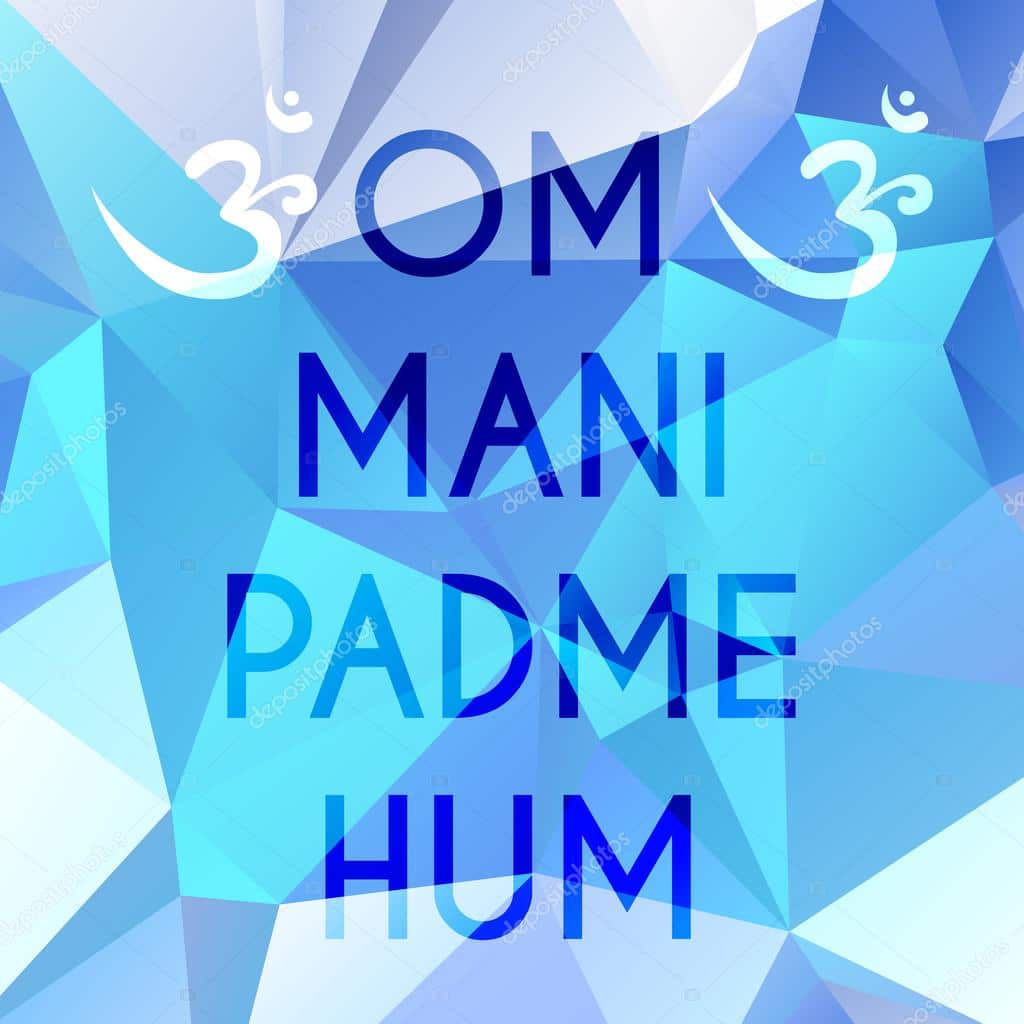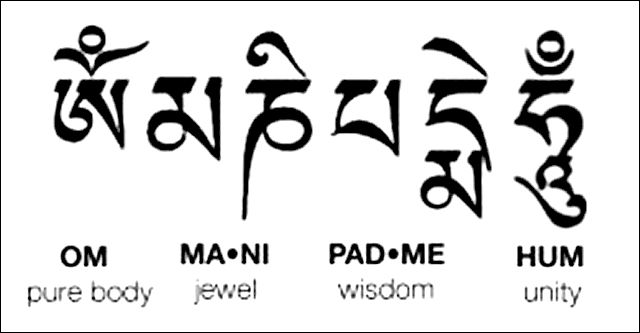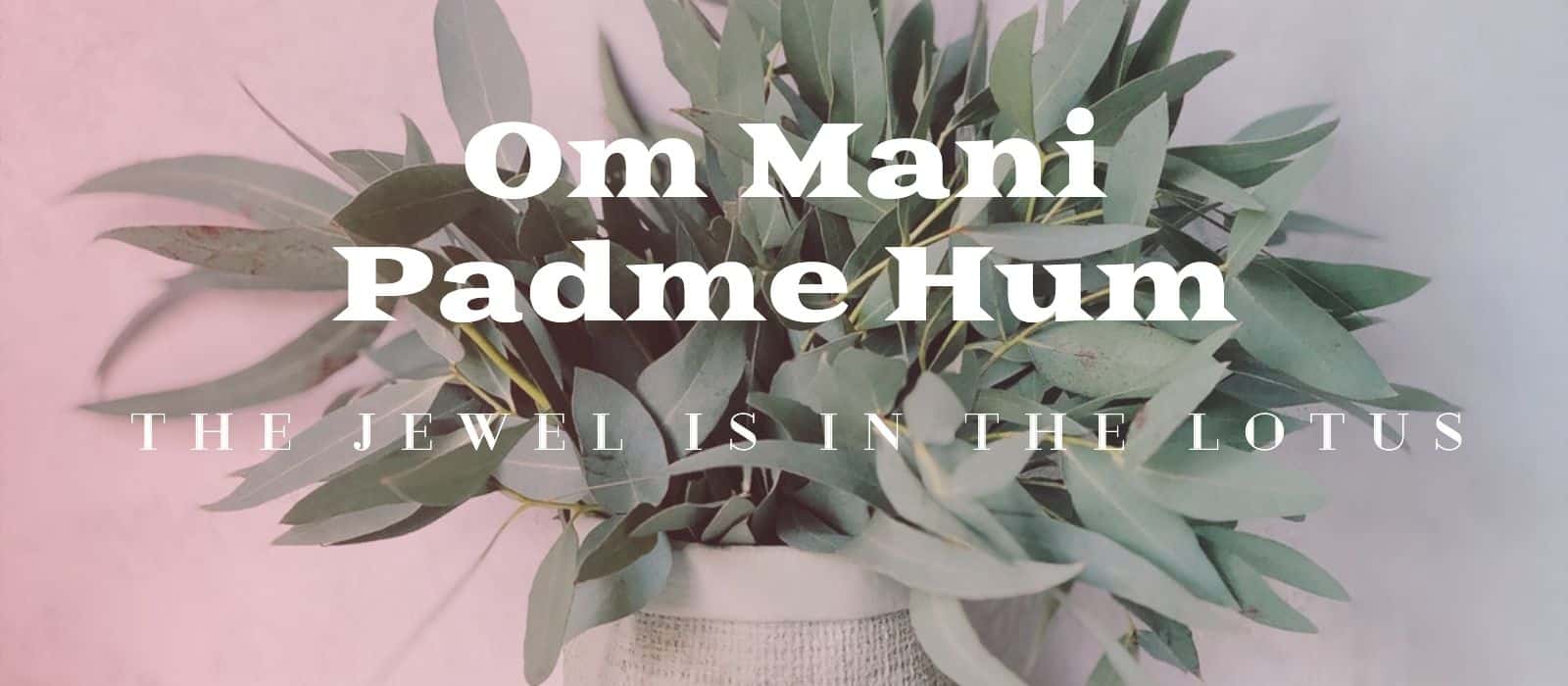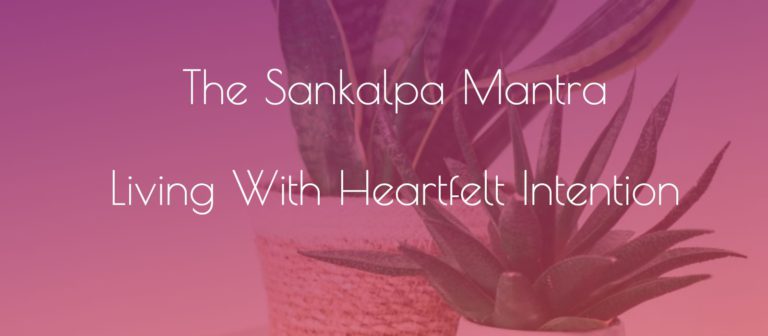Om Mani Padme Hum is the mantra of love and compassion. It is the mantra of awakening the collective consciousness. It is the mantra of connecting with the Universal Consciousness.
Amit Ray
15 Benefits of Reciting Om Mani Padme Hum
Om Mani Padme Hum is one of the most widely used mantras in the world. It is a powerful chant, which proponents believe allows them to enter into a deeper state of meditation, self-awareness, and divine oneness.
In this post, we’ll cover what the Om Mani Padme Hum mantra is, its meaning, and how to use the mantra, along with some of the many benefits of incorporating this mantra into your meditation practice.
Click Here to signup for The Joy Within, and get access to this and other guided mantra meditations.
What Is Om Mani Padme Hum?
“Om Mani Padme Hum” is a mantra associated with Tibetan Buddhism, particularly with the practice of Avalokiteshvara, the bodhisattva of compassion. This mantra is widely recited and chanted by Buddhists and is considered one of the most important and powerful mantras in Buddhism.
The mantra is often recited as a form of meditation, and the belief is that the repetition of these sacred syllables invokes the blessings of compassion and helps cultivate qualities such as love, compassion, and wisdom. The mantra is also inscribed on prayer wheels, prayer flags, and stones, and it is recited in various rituals and ceremonies in Tibetan Buddhism.
Learn more about common mantras here.
Om Mani Padme Hum is usually translated to mean The Jewel Is In The Lotus. It is said to be one of the most powerful mantras, such that even saying it a single time can be enough for an experienced disciple to release negative karma and achieve enlightenment!
Om Mani Padme Hum – Benefits
While there are innumerable health benefits of om mani padme hum, Buddhist tradition tells us there are 15 primary reasons to use this mantra.
The Major 15 benefits of Reciting Om Mani Padme Hum
- In every life, you will meet with virtuous kings, or spiritual leaders, which will provide the opportunity to practice Dharma.
- You will always be born in a place where the practice of Dharma is widespread and easily available. For example, you will have access to temples, gurus, and practices to help you attain joy and enlightenment.
- You will always have all of the necessary conditions for your practice. You will have enough good fortune to be able to practice your meditations and teachings.
- You will have opportunities to meet virtuous friends.
- You will have a body that is perfect and capable of carrying you towards enlightenment.
- Your mind will become attuned to the path of virtue.
- You will create a strong sense of personal morality, which will not diminish.
- People in your life will be harmonious with you.
- You will always have enough financial well-being and wealth to live well.
- You will always be protected and served by others.
- You will not lose your wealth to thieves and robbers.
- You will have the ability to succeed at whatever you choose for yourself.
- You will always be protected by virtuous nagas and devas.
- In every life you will be in a position to see Buddha and hear the Dharma.
- When you hear the Dharma, you will be able to understand and practice the divine meaning of emptiness.
Anyone who recites this mantra and uses it consistently in meditation will be able to develop these virtues. As with any spiritual practice, the meaning and impact of the mantra may be deeply personal, and individuals may choose to incorporate it into their lives based on their own beliefs and experiences.
Benefits of Chanting Om Mani Padme Hum 108 Times
Chanting the mantra “Om Mani Padme Hum” 108 times is a traditional practice in many Buddhist traditions and is associated with several symbolic and spiritual benefits. Here are some of the perceived benefits:
- Spiritual Focus and Discipline: Chanting the mantra 108 times requires concentration and discipline. It can serve as a form of meditation, helping individuals develop focus and mindfulness.
- Symbolism of the Number 108: In Hindu and Buddhist traditions, the number 108 is considered sacred and symbolic. It is believed to represent the wholeness of existence, with 1 symbolizing the universe, 0 representing emptiness or completeness, and 8 symbolizing infinity or eternity.
- Purification: Chanting the mantra repeatedly is thought to have a purifying effect on the mind, body, and spirit. It is believed to help cleanse negative energies and purify one’s thoughts and actions.
- Connection with the Divine: The repetition of the mantra is seen as a way to connect with the divine or sacred energy associated with Avalokiteshvara, the bodhisattva of compassion. It’s a means of invoking and embodying the qualities of compassion and wisdom.
- Karmic Merit: In Buddhist philosophy, chanting mantras, including “Om Mani Padme Hum,” is believed to accumulate positive karma. This positive energy can contribute to spiritual growth and well-being.
- Alignment with Chakras: Some practitioners believe that chanting the mantra 108 times helps activate and balance the seven chakras, the energy centers in the body. Each repetition is thought to resonate with the energy of a specific chakra.
- Completion of a Cycle: Chanting the mantra 108 times is considered a complete cycle. It is believed that completing such cycles brings a sense of fulfillment and accomplishment, reinforcing the spiritual practice.
- Mantra Repetition for Inner Peace: The rhythmic repetition of the mantra is believed to have a calming effect on the mind. It can be used as a tool to create inner peace, reduce stress, and promote a sense of well-being.
Health Benefits of the Mantra
In addition to these traditional benefits associated with this mantra, Om Mani Padme Hum also offers many mental, physical, and emotional benefits. Mantra meditation is a powerful process for helping us to eliminate negative and unwanted thoughts, so we can enter into a state of right mental thinking.
Because of this, mantras help us to reduce stress and promote positive, healing energies within the body. While the scientific research is inconclusive, many practitioners report an overall improvement in physical health, with results ranging from weight loss to improved mental acuity and focus.
It is reasonable to expect that, as the mantra fosters a clear, positive mind with less stress, that consistent use of the mantra can ease many chronic ailments associated with stress and negativity in the body.
Additionally, many practitioners have reports deep states of emotional release, and claim an ability to heal past traumas or emotional blockages through the use of this mantra.
Reports of Miracles from Using Om Mani Padme Hum
Some individuals claim to have experienced profound transformations, healings, or positive life changes through their devotion to the mantra. These reported “miracles” are often shared within specific religious or spiritual communities and may include instances of improved health, emotional well-being, or changes in life circumstances.
However, it’s crucial to interpret such accounts within their cultural and religious context and recognize that personal beliefs, expectations, and the power of suggestion can influence perceptions of miraculous events. These stories are typically considered matters of faith and may not be subject to scientific validation.
If you’re interested in exploring individual experiences with chanting “Om Mani Padme Hum,” you may find such accounts in books, online forums, or discussions within Tibetan Buddhist communities. Keep in mind that personal narratives vary widely, and the interpretation of events as miraculous is subjective.
Meaning and Significance: The Jewel Is In The Lotus.
The six syllables, om mani padme hum, mean that in dependence on the practice of a path which is an indivisible union of method and wisdom, you can transform your impure body, speech, and mind into the pure exalted body, speech, and mind of a Buddha.
Tenzin Gyatso, The 14th Dalai Lama

English Translation
As I mentioned above, Om Mani Padme Hum is most commonly translated as: The Jewel Is In The Lotus.
According to Buddhist traditions, reciting this phrase is one tool that can help aid you on the path to enlightenment, and the Dalai Lama consistently praises its power to purify the mind and help you cultivate inner wisdom.
In the phrase, the “jewel” is a pure state of mind, or enlightenment, while the “lotus” is a symbol for wisdom. In other words, wisdom leads to enlightenment.
The wisdom intended in this phrase is not knowledge, but rather a sense of inner sight and clarity of mind. Quieting the mind the mind is an important path towards enlightenment.
The 4 Syllables
Let’s break down the phrase into it’s individual words.
- Om: Represents the embodiment of the ultimate reality or consciousness. This is the sound of the universe. The universal energy, or God-force, which is said to be placed in action through the vibration of the sound Om.
- Mani: Means “jewel” and symbolizes the altruistic intention to become enlightened, compassionate, and pure like a jewel. Mani should really be viewed in terms of each syllable. The first, “ma” sound is intended to release jealousy and attachment, while the “ni” sound is intended to cultivate self-compassion and patience as we release desires.
- Padme: Means “lotus” and symbolizes wisdom. The first syllable, “pad,” releases judgments and prejudices that we hold, while the second syllable, “me,” increase our concentration as we release those judgments. The lotus grows in the mud but remains pure and unstained, representing the potential for enlightenment amidst the challenges of life.
- Hum: The final syllable represents the indivisibility of method and wisdom, and it is associated with the purification of body, speech, and mind. Hum is said to represent the unshakeable force, and is used to cultivate a sense of inner wisdom, while releasing thoughts of hatred or aggression.

| Syllable | Six Paramitas | Purifies | Samsaric Realm | Colors | Symbol |
| Om | Generosity | Pride and Ego | Devas | White | Wisdom |
| Ma | Ethics | Jealous and Lust | Asuras | Green | Compassion |
| Ni | Patience | Passion and Desire | Humans | Yellow | Body, speech, and mind |
| Pad | Diligence | Ignorance and Prejudice | Animals | Blue | Equanimity |
| Me | Renunciaion | Greed and Possessiveness | Pretas | Red | Bliss |
| Hum | Wisdom | Aggression and Hatred | Naraka | Black | Compassion |
Om Mani Padme Hum vs. Aum Mani Padme Hum
One common variation of the mantra is aum mani padme hum.
There is a slight difference in the two versions of the mantra. Both are associated with Tibetan Buddhism, but they have variations in terms of pronunciation and the use of different sacred syllables.
- Om Mani Padme Hum:
- This is the more commonly known version of the mantra.
- It uses “Om” at the beginning, which is a sacred sound in Hinduism and Buddhism, representing the essence of the ultimate reality or consciousness.
- “Om” is often used as a universal sound that transcends cultural and religious boundaries.
- Aum Mani Padme Hum:
- The use of “Aum” instead of “Om” reflects a variation in the pronunciation and transliteration.
- “Aum” is a similar sacred sound in Hinduism, considered the cosmic sound or vibration of the universe.
- In this version, the transition from “Aum” to “Mani Padme Hum” maintains the core mantra associated with compassion.
In practice, the choice between “Om Mani Padme Hum” and “Aum Mani Padme Hum” may depend on regional or personal preferences, and both are recognized as valid expressions of the mantra associated with Avalokiteshvara, the bodhisattva of compassion, in Tibetan Buddhism.
The essence of the mantra remains the same, emphasizing compassion and wisdom.
Free Download: Om Mani Padme Hum MP3
There is an mp3 download of Om Mani Padme Hum available in The Joy Within members’ area.
Here is the traditional Om Mani Padme Hum song set to meditation music.
Guided Om Mani Padme Hum Meditation Song with Music
Here is a youtube version of the mantra. Learn more at The Buddhist Centre website.





g
You will not lose your wealth to thieves and robbers.
This doesn’t sound very Buddhist if taken literally at least.